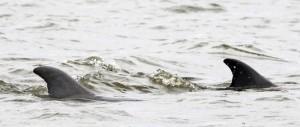Researchers continue to assess the damage to the Gulf of Mexico caused by the Deepwater Horizon oil spill. Among the numerous studies that are a part of the Natural Resource Damage Assessment, one takes a close look at potential damage done to marine mammals in the Gulf. An aspect of this work includes the careful identification of dolphins along the Gulf Coast.
Dolphins' dorsal fins are unique identifiers—much like human fingerprints. Scientists are capturing and analyzing thousands of photographs of these dorsal fins and using them to build a database to track where the dolphins live and travel.
This tool helps NRDA researchers determine whether the oil is impacting the dolphins' health and migration patterns. It also enables researchers to better track the dolphins' survival and reproduction rates.
A group of journalists recently joined a NRDA dolphin identification team on a trip in Mississippi Sound. Their stories are available here: Mississippi Public Broadcasting, the Mississippi Press and WLOX TV13.
Read about another dolphin NRDA study in Barataria Bay, LA.


